One of the first things I discovered on my visits to Belgium was the music of TC Matic, something as much a part of the country as waffles or French fries. Both the voice of the sadly departed Arno and the guitars of Jean-Marie Aerts, gave life to extraordinary songs full of fine Belgian humour. We wanted to know more about the life of Jean-Marie Aerts who, apart from TC Matic, has released interesting solo material and has become a renowned producer. In addition, a few months ago he released 23, his latest collaboration with Dirk Da Davo within the DDDJMX project.
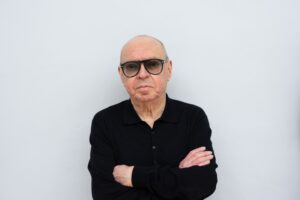 —During the 70s, you played in a few Belgian rock band like Bien Servi, Louisette, Luk Vankessel & Split, Specimen & The Rizikoos and also with Bert De Coninck. According to you, how these experiences influenced in your way of playing the guitar? Do you think that these first bands, in a way, were a necessary step to make the music of TC Matic?
—During the 70s, you played in a few Belgian rock band like Bien Servi, Louisette, Luk Vankessel & Split, Specimen & The Rizikoos and also with Bert De Coninck. According to you, how these experiences influenced in your way of playing the guitar? Do you think that these first bands, in a way, were a necessary step to make the music of TC Matic?
—Jean-Marie Aerts: Not so necessary, but it happened. For me, it was a normal process. I played with different people in Belgium, and when I joined TC Matic, a lot of people said that I was mad. But for me it was a logical step. It was in my mind and I was at the right place at the right moment. I was sucked into the group. I was a kind of a missing link.
—What do you mean with “missing link”?
—Jean-Marie Aerts: Well, they were five when I saw them live. But then, at a gig, the guitar player, I knew him, said he was leaving the group. I saw TC Matic with him live, and I was shocked by the music and the attitude and they were also very brave to play this kind of music. So, when he left, it was a logical step for me to join in because I’m also from the coast in Belgium. And they’re all from the coast, so that helped a lot as well.
—And they were quite different from everything you did before, right?
—Jean-Marie Aerts: Yeah. But not in my mind. I had an evolution which was, for me, normal. But I can imagine it was a bit of a shock for the outside. People wondered: -what is happening now? He doesn’t fit or whatever. But it did for me. For me, it was okay. It was very logical.
—As a guitarist, you said that one of your idols was Jan Akkerman, what did you find so special in his playing?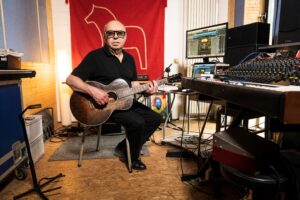
—Jean-Marie Aerts: First, he was a European guitar player. His influences were also classical, but also Russian in the melodies and he had a Balkan type of guitar playing too. His technique was outstanding and fabulous and, he still got this rocking attitude from a guy from Amsterdam. He was inspiring for me. And I could see him play live. At the beginning Focus were not that famous. They were just a beginning group in Holland. But when I saw them at the Belgium coast where I lived, they blew me away. It was very rocky. They were rocking, but with classical elements as well. And different than most of the symphonic groups. It was mere rock and roll. That’s why I liked him.
—What’s your favourite album of all the ones he was involved?
—Jean-Marie Aerts: That’s difficult because he made his first solo album when he was 18 years which is brilliant. It was called Talent For Sale. And then he joined Brainbox, a Dutch band. A very interesting group based on blues, but not blues in the general format, very personal. Later he joined Focus. And everybody knows “Hocus Pocus“ I guess, at least the riff. And finally, he’s got a lot of solo albums after Focus. So, if you ever find the time, start the journey of discovering his music.
The most important thing is that he played like a European guitar player. It was different.
—Being Spanish and of a different generation, it’s difficult to get what TC Matic meant at the moment. I heard once a description that said that you were the Belgian Talking Heads. In hindsight, how do you see the importance of the band for European music?
—Jean-Marie Aerts: You can check a lot of live clips, from Scandinavia, from Holland, concerts and festivals. And it’s better to see it than I can explain it. We were as well a European band, a continent band, I would say. We did things that no other groups did. We played in festivals with Public Image and with Siouxsie and the Banshees and other English bands. We were not afraid to play because we were good. We worked a lot on that too, to become a very solid band. There were also influences from tango to old blues, to electronic music, to James Brown and all that mixed together with our Belgian attitude or how we call it “expressionism”, that we have in Belgium all the artists and writers who are a bit gaga. Belgium is a very special country for that, for music, for art, comics, films. We are really good on research on different fields let’s say medicine, electronic devices. Good chocolate and very good beers. That’s TC Matic as well.
—How was working with the late Arno?
—Jean-Marie Aerts: Oh, we had some very good years together. It was very nice. For me, they were the best years of my life, musical-wise. Now I enjoy it as well, but then we had fun composing. I remember just composing with Arno in the living room with a little drum computer and the bass guitar. And then, every week or when we could we put the ideas on tape. And after, we went to the rehearsals with the ideas and worked it out with the group.
—Was there any chance of having TC Matic playing together before his passing?
—Jean-Marie Aerts: No, there were some moments years ago that they were talking about it, especially the festivals, Rock Werchter wanted us. But then he said yes. And then he said no. And maybe it was better not to do it.
—But it could have been a good chance for your younger fans of seeing you live.
—Jean-Marie Aerts: It could have been good because they were planning to book big festivals all over Europe. But it didn’t happen. That’s it. That’s life.
—Talking about the music that the band release, what made Choco your favourite album of TC Matic?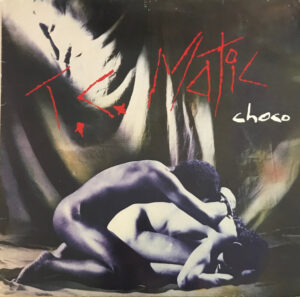
—Jean-Marie Aerts: I like the three of them, or the four of them. But Choco was for me and for the group very special. We had already done a lot of tours. And we were playing better in the studio. The songs were good. We were very good playing together. Also the group was very organized, musically and technically. And everybody had more fun. Normally at the beginning, the studio is a bit scary. When you’re going in the studio, you’re a bit nervous. But I like to be in the studio. I was before playing with them, already producing in studio, so I felt comfortable. But then in Choco everybody was comfortable. I had that impression: I like that. I still like the record.
—You produced Lavvi Ebbel, Red Zebra, Arbeid Adelt!, Luc Van Acker, can we say that you help creating the sound of Belgian New Wave? We interviewed Luckas Vander Taelen and he said that you found a very original sound for the band. Was this what musicians were looking for you when working with you as a producer?
—Jean-Marie Aerts: It could be, I don’t know. I never thought about it like that. I just went on. When somebody asked me to produce one album, and if I liked it, I said okay, and then I wasn’t aware of doing this or doing that. I just wanted to record the group or the artists as good as possible and let them have fun in the studio. To learn to work in the studio, that it’s a creative environment. So, I was busy about that, not thinking: oh, I’m doing this or that. But yeah, if somebody wants to call it like that, that’s good. No problem.
—The singer from Labby Ebbel said that you found a very original sound for the band. Do you think that these bands were looking for an original sound?
—Jean-Marie Aerts: Yeah. I think so.
—And did you have any influence as a producer?
—Jean-Marie Aerts: I learned a lot from Steve Lillywhite at a certain point. But I liked also some reggae producers, like Lee Scratch Perry and Dennis Bovell in London, who did a Linton Kwesi Johnson album. Everything from the West Indies, they really live the music there. The Jamaican music. Reggae, dub… these were also my influences. Scratch. Doctor Alimantado. All these things. The real roots reggae, but well done.
I recall that, before in Belgium, the studios were not really rock-minded. So then I did a couple of productions at a studio in London, Matrix.
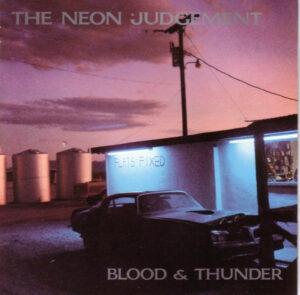 —You produced The Neon Judgement’s Blood and Thunder, Dazsoo, and played also in The Insult. How do you remember working with Dirk Da Davo and TB Frank? What do you remember of these productions?
—You produced The Neon Judgement’s Blood and Thunder, Dazsoo, and played also in The Insult. How do you remember working with Dirk Da Davo and TB Frank? What do you remember of these productions?
—Jean-Marie Aerts: I liked it a lot. They have a great sense of humour and they also have big influences in their music. On Blood and Thunder, there’s even a bluesy song on it. One on the first side, I can’t remember the title with the slide guitar. You know the track?
—¿Facing Pictures?
—Jean-Marie Aerts: That’s the one. And there is also “1313”. Luc Van Acker also produced some tracks.
—So, I guess this was the time when you meet Dirk Da Davo,
—Jean-Marie Aerts: Yeah, but his parents were living very close to where I was living at the time. In Kessel-Lo near Leuven. They were doing a lot of touring, but it was in a different circuit. At that time, I was with TC Matic. They had a different public, but we were doing the same thing, just making music. I liked their music. We had a good time in the studio and we still have. I have seen Da Davo a couple few times now in Fuerteventura.
We always make music. And I take care of his guitars. And put new strings on them, I like that.
—Let’s continue: your most popular production was the first album of Urban Dance Squad. At the time there was not anything like that in Europe…
—Jean-Marie Aerts: Neither in the States.
—True, how did you approach something that was so new at the moment?
—Jean-Marie Aerts: For me, it was normal. I produced the Dutch band DE DIV before and their drummer came to me with a cassette and said: “I’ve got a little new band, do you want to have a listen?” And I listened to it and it was explosive. I directly found it fantastic. And then, I talked to the studio manager, ICP, and he was also wild about it. The combination of these five characters made something very special. And you could feel it in the recording that it was something different. And they proved to be that. In America, they played in Los Angeles and at The Troubadour, clubs that were famous for their beginning bands. Before Urban Dance Squad played a group, but it was more traditional rock and roll but afterwards it became Rage Against the Machine. They like Urban Dance Squad over there and even The Red Hot Chili Peppers were influenced by them. There were some rapper influences, of course, in the band, but it wasn’t American, you know, it was also, again, European. And that’s why they liked it. And they were fabulous live as well. Fantastic group. Very good musicians. Hell of characters together, but very exciting to work with, creative. Everything you need as a producer to have a good work.
—How do you get interested in electronic music? At the second part of the nineties, under the JMX AKA, you released some electronic EP entitled I, II and III and the album Autonome. All these works were done all by yourself at home right?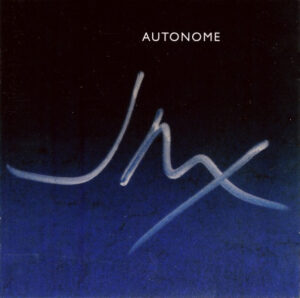
—Jean-Marie Aerts: I would just pick up an instrument and make a loop or something and play on it and get DJ DNA on it. And later I would put some guitars on it. Of course, I am interested in every type of music. But it wasn’t purely electronic, it was organic with electronic influences. And dance influences from DJ DNA from Urban Dance Squad. Even there was a track with Dirk Da Davo called “Wow Ze Wow“.
Sometimes I ask some musicians to play bass or I even asked DNA to DJ in a track. That helps a bit. I don’t work always on my own. I did some gigs with the band JMX. With Tikiman as well. He is on the Parbleu album. Tikiman is a MC from Dominica who lives in Berlin.
—Last year you released your first album under your name, entitled, Domeztik in a more jazz/funk direction. Is the album a consequence of your latest concerts? Did you want to go back to more organic material?
—Jean-Marie Aerts: It could be. I don’t have a special style. I like every type of music when it’s good. That’s why you get a bit of a mishmash of styles and music. I don’t mind. I prefer to have different tracks on an album than one formula and always the same. It’s boring for me to work like that. And just lately I did some music beats for a very known dance company, Rosas in Belgium, which is all over the world. And so they asked me to do that, and I enjoyed doing that on my own. You have to check it. It’s called Exit Above. With Anne Teresa de Keersmaeker
—Ok, I will check it out.
—Jean-Marie Aerts: The music and all the beats are from a year ago, and they’re still touring with it.
—Your first album with DDDJMX was a result of your holidays in Spain. We have already talk with Dirk Da Davo about it but how did you experience the jams that finally ended with forming the album? How did you describe the chemistry between you and the leader of Neon Electronics?
—Jean-Marie Aerts: Natural. The thing is, when I went there, I always want to do something. I knew that he had moved to Fuerteventura. And then, I went over and he had his studio there, with guitars and everything. So, I said, yeah, okay, let’s do some tracks. Give me a beat. And then I put guitar and bass parts on it. And when I left, he had fun with the material and put some vocals, changed things. But I always gave him the basic things to work with. Together we recorded 4 or 5 tracks every time I went there. And for me, it was important to do because, I feel a bit useful when I can play some music and record some music. I’m not a good tourist. I like Fuerteventura. It’s nice, but I need some music as well. And Dirk needs it also. Did you hear the album?
—Yes, of course. I liked it. And what can you please tell us of 23 your last EP with Dirk Da Davo as DDDJMX? Was it again a result of your holidays?
—Jean-Marie Aerts: Yeah, we have done the same every time I went there.
—So, what else can you tell us about this EP?
—Jean-Marie Aerts: I think it’s nice. I like the first track, it’s a bit like a Sly and the family Stone, a bit funky, I like it. I like the other tracks as well. And there’s one, “Wow Ze Wow”, which is an old track from 96 that we did together as well in Belgium.
—Why did you choose to record it again?
—Jean-Marie Aerts: It’s not recorded again. It’s the same version. It’s just mastered a little bit. That’s it. And it was released on one of my vinyls in the beginning, the first one, 1. It’s on the A side and the flip side is called “Yep”.
You can find more info albout Jean-Marie Aerts at www.jeanmarieaerts-jmx.be

